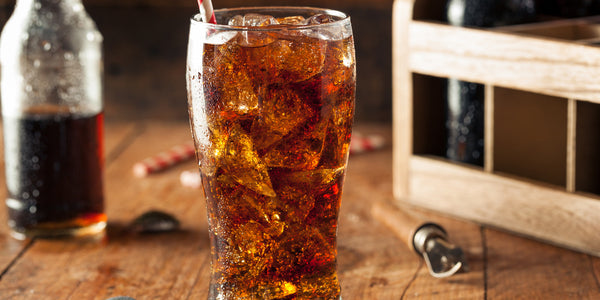
To look at your average soda pop advertisement, you'd think that those sweet, bubbly brews of flavored sugar water are the very elixir of life. It seems the truth is far from the Madison Avenue image.
You don't see many soda pop ads that promote their product by showing an overweight couch potato with a cigarette in one hand and a can of soda in the other.
But a recent study of nearly 100,000 women showed that- females at least-those who drink sweetened soda pop are MORE likely to be inactive, to smoke, to eat more processed sugars even ASIDE from their sodas, and to have higher daily intake overall.
And while they were less likely to drink alcohol, they were also LESS likely to eat a sufficient amount of protein or fiber.
The investigators weren't claiming any CAUSAL relationship between the sodas and these unhealthy factors.
But if you're a sweet soda drinker, you are in some risky company, statistically speaking. It might be worth looking at whether it's time for a change …or two…
A study came out a couple years ago that showed that just one sweetened soda per day during childhood can result in obesity for children. But not everyone assumed that the same result could be expected in their moms or other women.
Turns out it can. Not only that, those sodas apparently put women at much higher risk not only for weight gain, but also diabetes and other health problems.
A new study of more than 90,000 women shows that over an 8-year period, women who drank sweetened sodas were nearly twice as likely to develop diabetes as those who drank other sweetened beverages, like fruit juices and punches.
The increased risk among sweetened soda drinkers was consistent even when the investigators adjusted for other variables like diet and activity.
The sugars in sweetened soda are highly processed and have a much more immediate effect on the metabolism than most kinds of dietary sugar. Over time, those short-term effects lead to long-term changes - - including weight gain.
Soda is a relatively new source of calories for the human population, and neither our bodies nor our cultures seem to have adjusted to it.
Worldwide, consumption of sweetened sodas has boomed over the last generation, up more than 60 percent since the late 1970s. As a global dietary change, that's significant, if not downright phenomenal.
Because sodas are basically sugar water - empty calories with no nutritional value.
And on top of that, studies show that -except for milk- the human body doesn't register a feeling of "fullness" from fluid calories the way it does from solid foods.
So if we're DRINKING a lot of our calories, we may not cut back on other intake, the way we naturally do when our calories come from solid food.
Until our bodies get better at sending the "had enough" signal, we're going to have to retrain our minds to consider our sweet soda intake as much as we would a candy bar.
Or we could take the easy route, and just stop drinking them.
Low Carb Sodas
It was only a matter of time before the beverage giants found a place on the low-carb bandwagon.
It looks like the time has come, but since we already had diet sodas, I didn't really understand the appeal of the new half-sugar, half-substitute sweetener sodas.
But some patients tell me they can't abide the aftertaste of some artificial sweeteners like aspartame, which doesn't bother me, though I remember the aftertaste when saccharin was the popular substitute.
These new sodas are half regular sugar -- or more likely, high fructose corn sweetener -- and half substitute sweetener, so they do have more of the regular sweetness people seem to want, but with only half of the previous carbohydrate count. And if you simply MUST drink soda, I guess that's an improvement.
But if you really want to go low-carb, why not just develop a taste for good, clean water. There's NO, carbs, NO calories, and NO sweetener aftertaste. And it will still be around after these trendy sodas are long gone.
SODA SODA SODA
If you find it hard to resist the hiss and snap of a fresh can of pop, you're not alone.
Over the last 20 years, Americans' soda consumption has virtually doubled - and so has the number of overweight Americans.
It's no coincidence. Researchers find that regular sweetened soda is the chief source of worthless calories in the American diet, far surpassing the more noticeable junk-food giants like fatty snacks and candy.
Your average American teenage boy now drinks 40 gallons of regular soda a year! Yet studies show that just one soda a day during the school years will add 20 pounds to a child's weight by graduation.
There are better beverage options. Just switching to diet soda can spare heavy soda sippers hundreds of calories a day.
But you and your kids might find your best choice in another of today's popular bottled beverages. Next time, try a water.
Sweetening the World's Diet
It's may be a small world, but it's inhabitants are getting bigger and bigger.
In today's global marketplace, the trends that brought the U.S. its obesity epidemic are crossing borders and oceans.
Chief among them is the increased consumption of sweeteners, and most of that is consumed in sodas. And it's having the same effect everywhere else as it has here: people are getting fatter.
Researchers say that as more and more societies around the world are urbanized and exposed to more media, advertising, and a whole range of cheap, manufactured foods, their traditional healthy diets are being replaced with lower grade mass-produced foods - and lots of soda pop.
More empty calories, fewer wholesome calories, and a corresponding rise in overweight, obesity and the usual health problems that come with them.
Around the world, there are people today who are getting almost half their calories from sugars and empty carbs. But a healthy body should have no more than 10 percent of it's daily calories from sugar, whether its in Boise or Bangkok.







